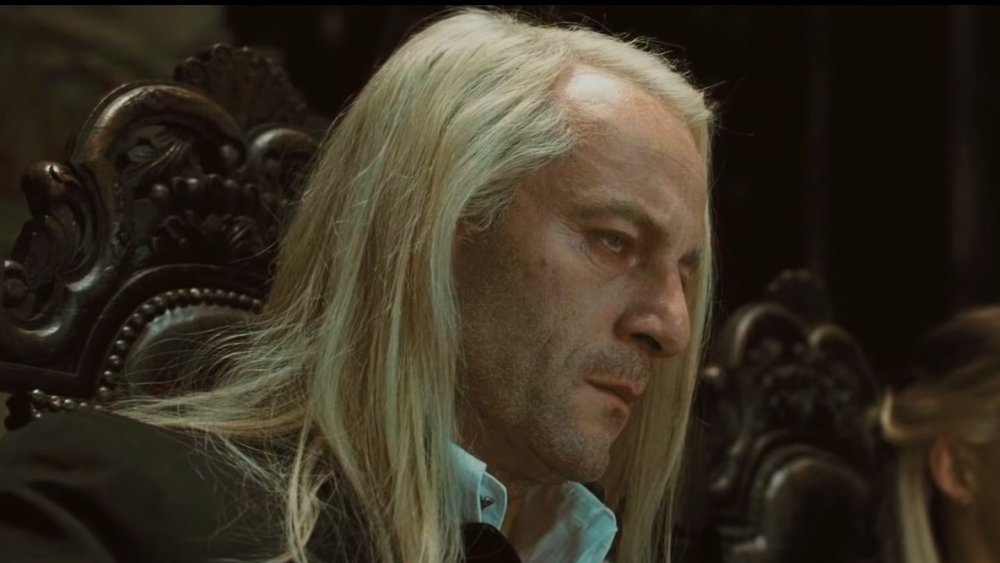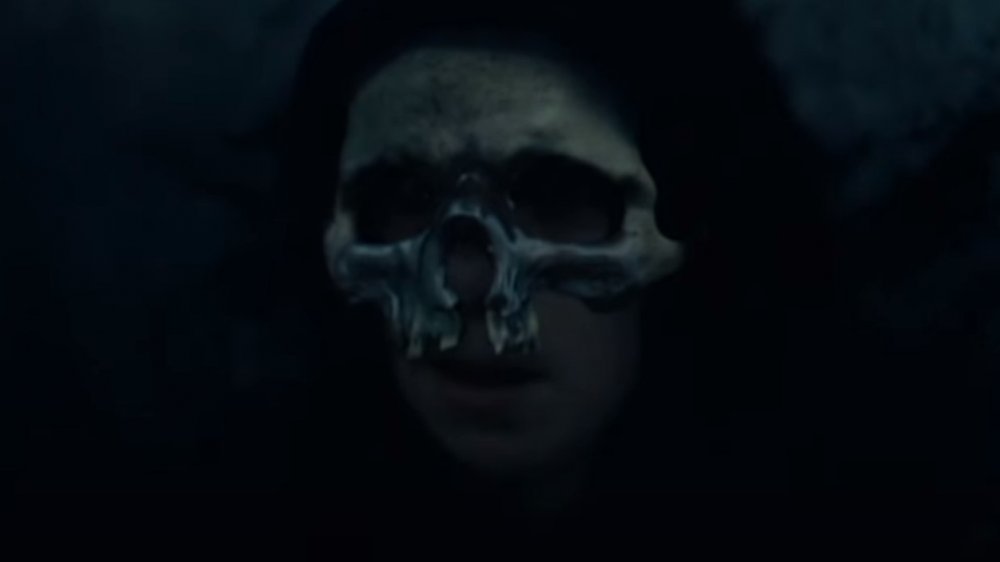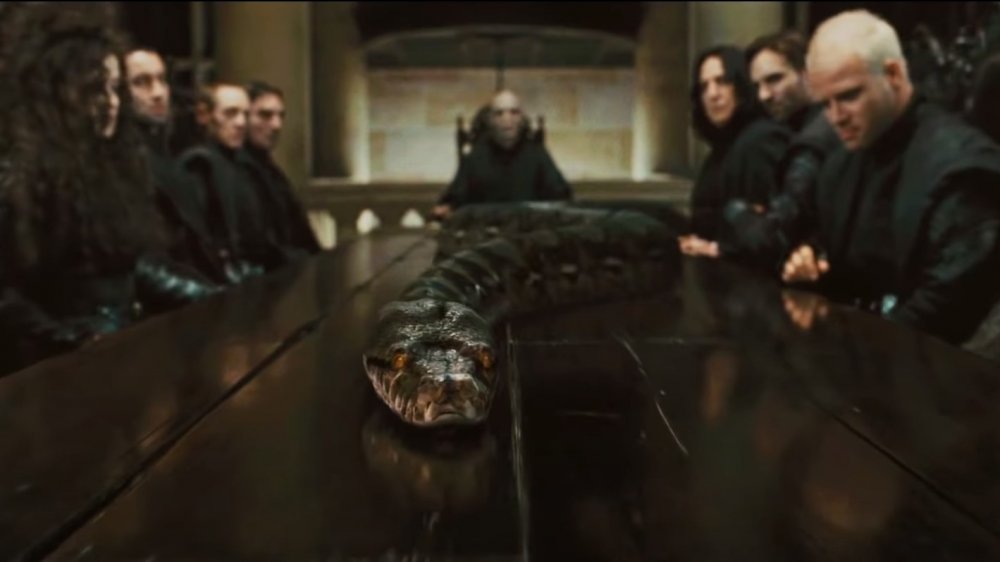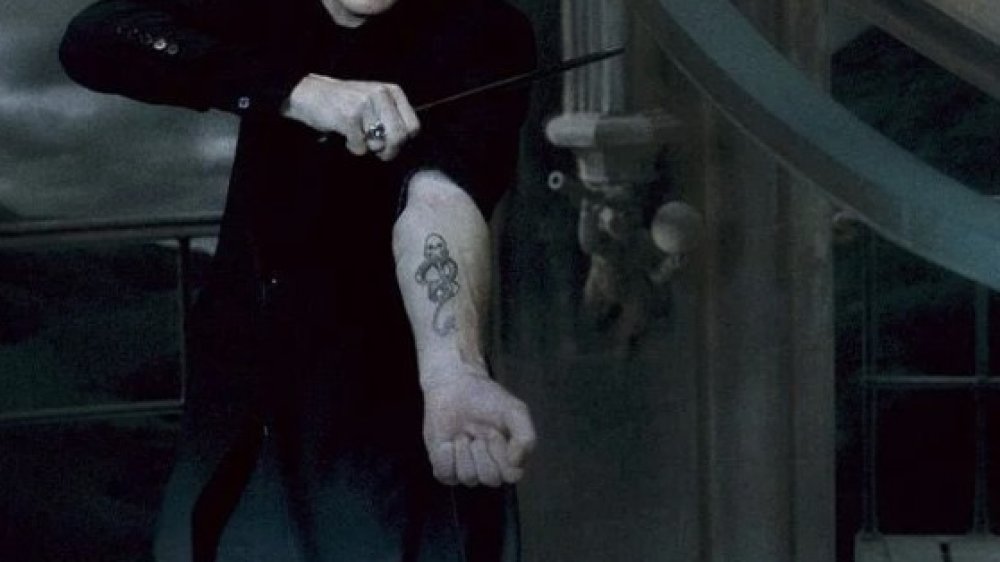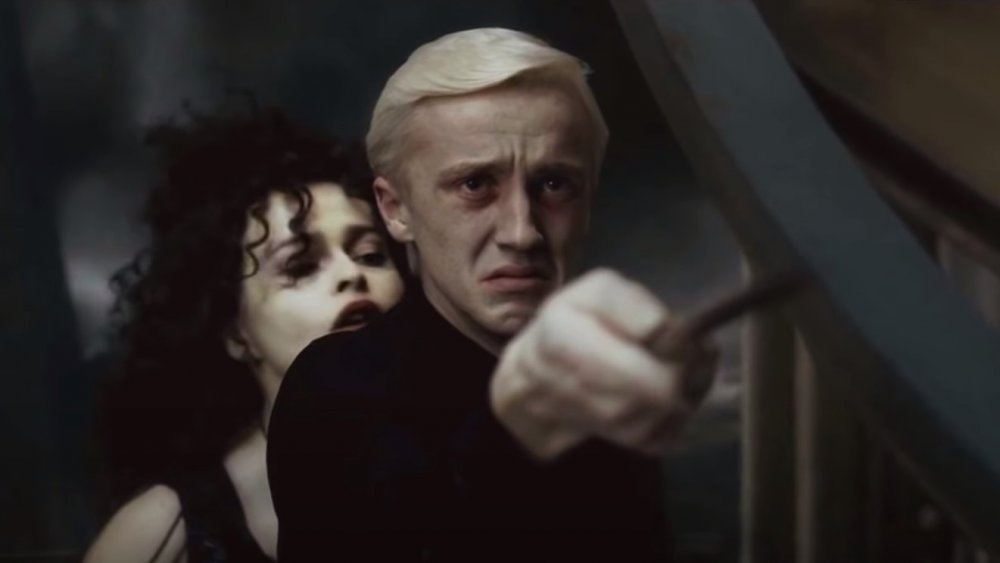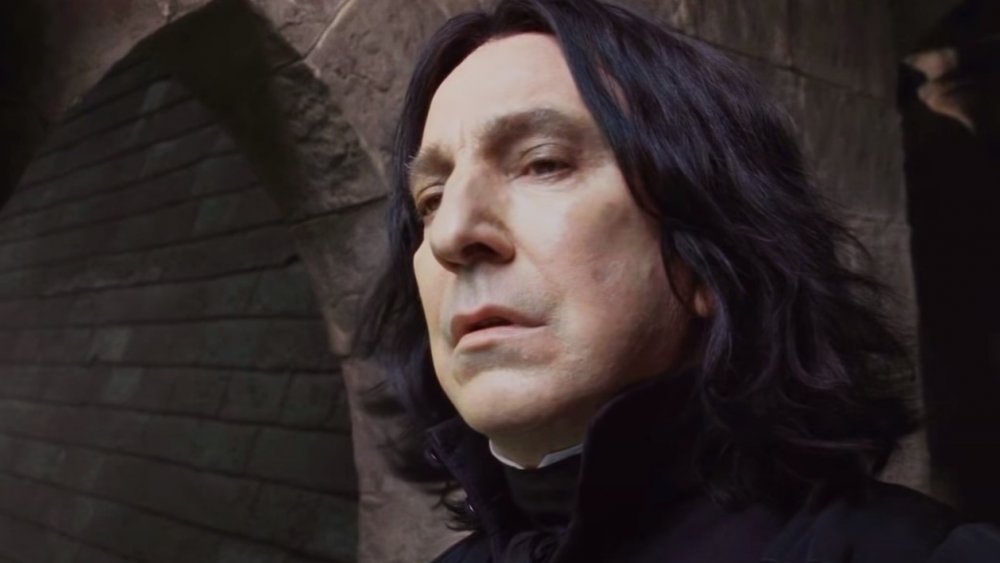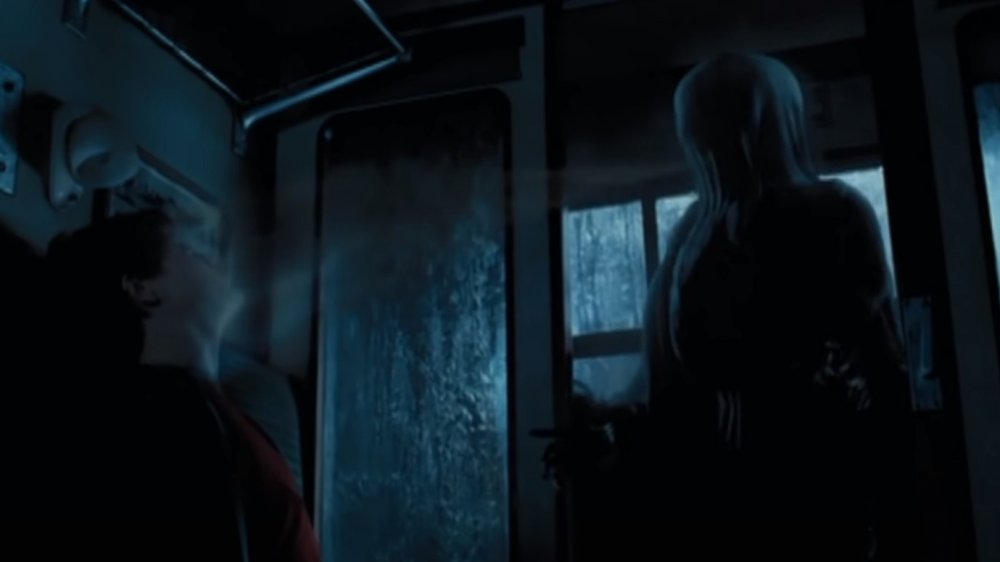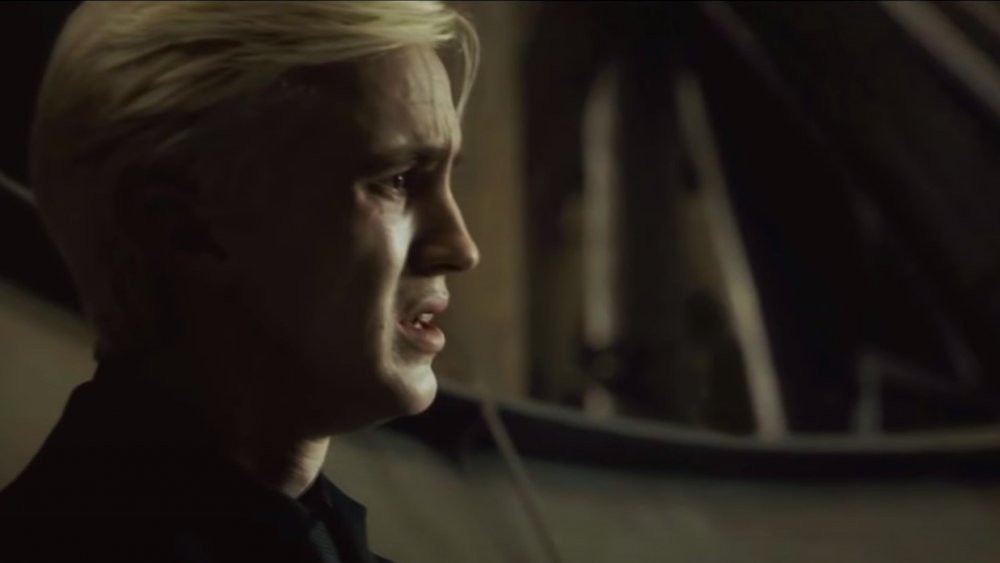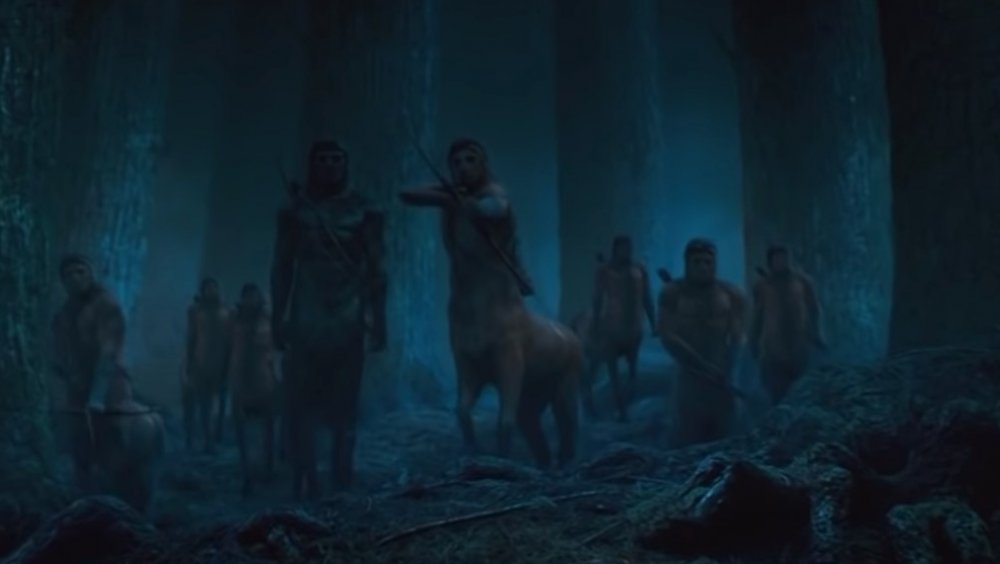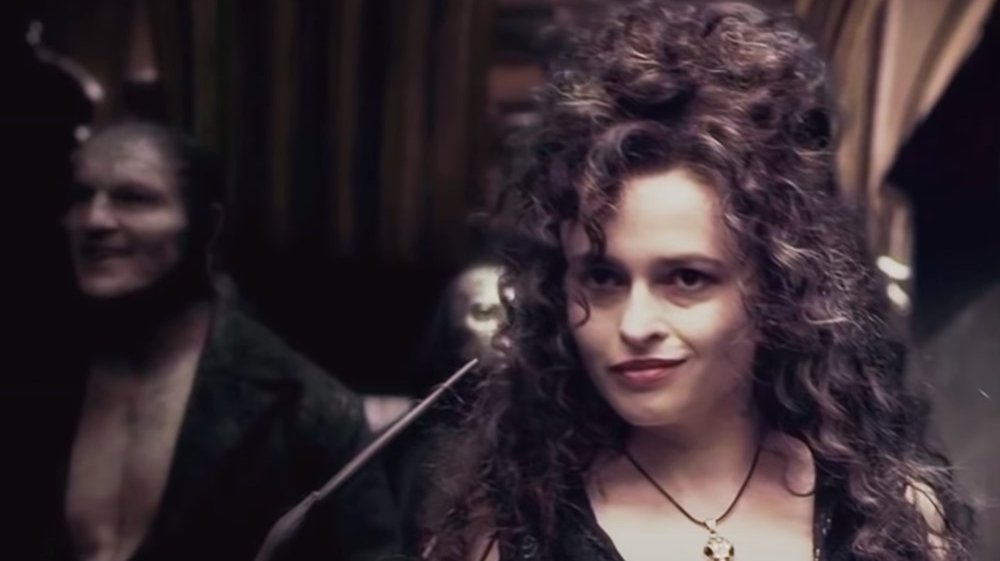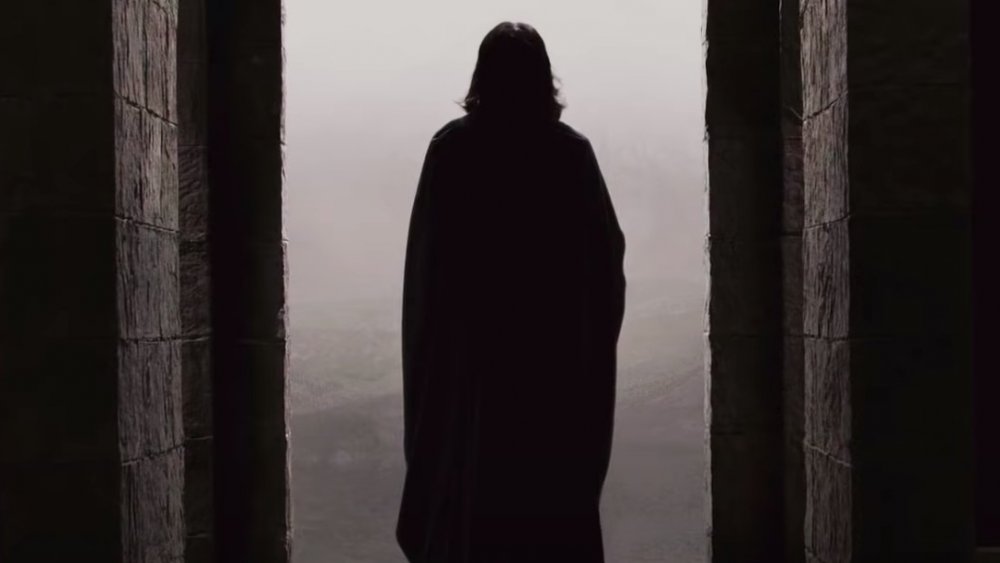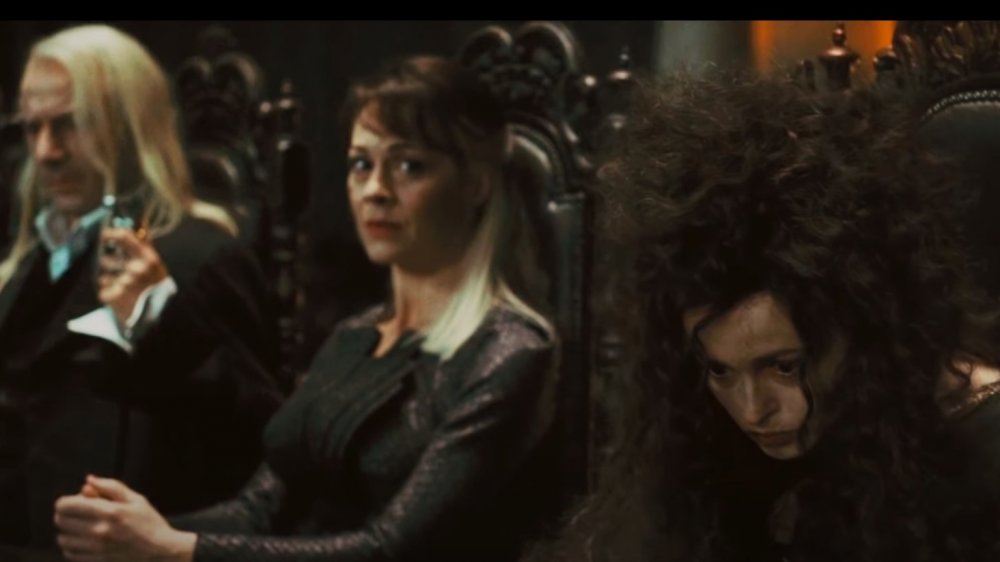Things That Make No Sense About The Death Eaters In Harry Potter
Few fans are more devoted than those who love the Harry Potter series. Though J.K. Rowling's magical saga has spawned a juggernaut franchise including movies, video games, and a theme park, there are still a few things about the Wizarding World that leave us scratching our heads in confusion.
Consider the villainous Death Eaters. Under the leadership of Lord Voldemort, this group comes to be synonymous with terror, prejudice, and cruelty for decades. Until a certain bespectacled boy and his ragtag group of pals put an end to the Dark Lord's reign, the Death Eaters threaten the magical and muggle worlds alike. Their goal is nothing less than total domination — which means complete subjugation for muggles, muggle-born wizards, and every non-human magical race.
Now, this is all very scary. But when everything is said and done, there are some things about the Death Eaters that demand explanation. We're here to examine everything that makes no sense about the Death Eaters, one dramatically engraved mask, horcrux, and Dark Mark tattoo at a time.
Masks and wands
Like any upstanding gang of fiendish followers, the Death Eaters sport a cohesive look: Masks and hooded cloaks that conceal the wearer well. Voldemort seeks to work unseen until the time comes to storm the halls of power. The Death Eaters' distinct look rises from this desire to work in the shadows, stripped of individual identity.
Masks and cloaks are a great way to stay anonymous ... for muggles. There's one big problem with wizards trying to disguise themselves this way, however: their wands.
Each wand is entirely unique and belongs to one wizard alone. Furthermore, It's easy to trace the owner of a wand — anyone, seemingly, can trot on down to Ollivander's and ask who any given wand belongs to, and when it was sold. Every time the Death Eaters use their wands, they're pretty much donning a t-shirt with their name printed on the front. Anonymous clothing just doesn't work for a group constantly waving totally unique and highly visible magical sticks for all to see.
Their numbers make no sense
No revolution is the work of a single person, even if that person is a snake-faced, semi-immortal, ultra-evil wizard like Lord Voldemort. As Voldemort gains power, he also gains followers, but exactly how many he gathers is never made clear. To take over an entire society and essentially rule the world, you probably need more than the 30-ish wizards and witches named in the books and movies. Yet those are all the Death Eaters fans are ever introduced to.
In the first war against Voldemort, the Dark Lord seems to have had the might of hundreds of supporters. But how many of those supporters were actual Death Eaters? Not every supporter of the Dark Lord is a Death Eater, as not every supporter of Dumbledore is in the Order of the Phoenix. This murkiness gives fans pause: Who, exactly, is doing Voldemort's dirty work? Can it all be chalked up to the handful of named baddies fans are introduced to? How much of it can be credited to the work of people like Sirius Black's family — wealthy purebloods who support Voldemort, but aren't going out at night to burn down houses and murder muggles in their beds?
Though the Death Eaters are undoubtedly a powerful group, no leader can hope to rule for long without a large army and widespread support. It's unclear if Voldemort ever had either of those, even if he had as much as a few hundred Death Eaters at one point.
The Dark Mark tattoos
In Voldemort's ideal world, the vast majority of all sentient magic-users would be treated as second-class citizens — at best. That doesn't just mean the subjugation of muggles and muggle-born wizards, however. Voldemort's rule would crush house-elves, centaurs, goblins, merfolk, and all other magical races.
It's brutal stuff, and sounds like it would make for a dull Wizarding World. Nothing is more boring than complete homogeneity. But the Death Eaters are all about conformity — consider their infamous Dark Mark tattoos. Every Death Eater sports the image of a skull with a snake protruding from its mouth on their forearm. They serve a specific purpose: By touching a single member's tattoo, Voldemort can summon the whole gang. It's like a magical group text that can't be ignored, slept through, or put on silent. It's also a marker of group identity, uniting the Death Eaters with a potent symbol they can never remove.
That's all very cool, scary, and memorable. But having the Mark placed somewhere as highly visible as the forearm, as the tattoo always is, is a confusing choice. Sure, wizards seem to favor long sleeves and billowing robes, but they don't wear them all the time. Forearms are exposed casually, accidentally, and pretty much all the time once the summer months set in. Are we supposed to believe the Death Eaters never unthinkingly roll up their sleeves at work?
Why don't they use conventional weaponry?
Alright, this is a big one with implications for the entire Wizarding World. Why don't the Death Eaters use conventional weaponry? Sure, the killing curse is unblockable. But it also takes time and effort to cast, and seems a little less effective than, say, a grenade launched right at Harry Potter's parents' house.
Obviously, this is the less fanciful choice, and would have made for a very short and far more grown-up book series. And admittedly, it's well-established that the magic of the Wizarding World tends to put muggle devices on the fritz. But what, exactly, are the parameters at work here? It's easy to imagine how a drone armed with bombs could get scrambled by magical interference, and/or detected by a wizard before it found its target. But what about a shrapnel grenade, or a pressure-sensitive land mine? Curses can be devastating, but still, the Wizarding World doesn't appear to have anything like the firepower muggle-kind has mustered. With a few choice weapons, Voldemort could have won in a weekend. Is Hogwarts really powerful enough to withstand, say, a nuclear weapon? We'll never know.
Mind reading could come in handy
Any good despot knows to value the loyalty of their followers. Few folks are as devoted to their leader as the Death Eaters, though some — looking at you, Bellatrix Lestrange — are a bit more fanatical than others. After Voldemort falls to the infant Harry Potter, many Death Eaters claim to have been under the Imperius curse. Then, upon Voldemort's resurrection, they return to his side, claiming unwavering loyalty. But how is Voldemort to know who is telling the truth?
It's simple: Legilimency. Legilimency is the magical art of reading minds. Voldemort is an accomplished Legilimens, as is Severus Snape. It is made clear that Voldemort uses this ability to check the loyalty of his Death Eaters on the regular — it's why Snape has to become so good at Occlumency, the ability that blocks Legilimency — but for some reason, he restrains himself in key moments. Take the Malfoy family as they exist late in the books, when their loyalty is crumbling. They harbor doubts, to the point that Narcissa Malfoy lies to Voldemort's face when he asks her if Harry Potter is really dead. Why doesn't he use Legilimency in that moment? Why, in so many crucial moments, does a man without any problem strolling into others' minds choose to trust their words alone?
The Dementors
The Dementors are truly wretched creatures. Their food? Human happiness. And for dessert? Oh, they'll just casually suck out your soul. The Ministry of Magic employs these foul creatures to guard the wizard prison Azkaban, keeping the inmates there subdued and miserable. But the Dementors quickly abandon their posts when Voldemort promises them all the sweet, sweet wizard souls they can eat if they help him take over the world.
Despite the fact that their presence alone is enough to bring wizards to their knees in despair, Voldemort and the Death Eaters seriously under-utilize them. It probably wouldn't be pleasant to have these grim and ghoulish helpers around all the time, granted, but imagine the havoc the Deaths Eaters could have caused if they'd brought Dementors along on their missions. Think about it: If you had a weapon that could literally take the hope and fighting spirit out of your enemies, wouldn't you bring it to every battle you could? Moreover, Dolores Umbridge is seen in Harry Potter and the Deathly Hallows using her patronus to keep the Dementors she uses to interrogate people from affecting her own mood. Couldn't the Death Eaters have employed similar protective measures for themselves?
They just give up when Voldemort dies
A worship of power unites the Death Eaters. Voldemort, to them, is power incarnate. Prejudice against muggle-born wizards and societal ties to each other bring them together as well, of course. But what truly binds them to each other is the belief that they are the best wizards around, wielding power that entitles them to rule the world. So, why, exactly, does this group of fanatics abandon their quest to take over the world when their leader dies?
When Voldemort falls, along with top lieutenants like Bellatrix Lestrange, the Death Eaters just ... give up. Some, like the Malfoys, are pardoned after helping the forces of good, and some are imprisoned, but the rest simply give up, disband, and melt back into normal society. How can it be that no resistance to this new status quo forms? Can there really be no Voldemort supporters out there, looking to finance further Death Eater havoc? They can't all have been faking their ardent devotion to Voldemort, and they can't all have suddenly given up their obsession with power. The Death Eaters disappear with far too much ease, given their hardcore devotion to domination at all costs.
Why don't they ask the centaurs about the prophecy?
First revealed to Dumbledore while interviewing Sybill Trelawney, the prophecy concerning Harry Potter and Lord Voldemort comes to shape the Wizarding World in climactic ways. Severus Snape, still loyal to the Dark Lord at the time, overhears the prophecy foretelling a child capable of defeating Voldemort, and tells his master all he heard. But Snape didn't actually hear the prophecy in its entirety, and so Voldemort becomes obsessed with hearing it in full.
Thus, the Death Eaters are sent to the Ministry to steal the record of the prophecy kept there. But actually, they could have just asked the centaurs for help. Despite their disdain for non-human magical beings, the Death Eaters seek help from them all the time — witness the way they work with the Dementors and the giants. But as far as we know, they never go to the centaurs for help.
This is a big mistake, considering the fact that the centaurs are highly skilled at reading the future in the stars. While their prophesying might be a little more vague and long-term than that of human Seers, it still could have proved useful for the Death Eaters if they had thought to seek help from some four-footed friends.
It's a small, small world
Voldemort's Death Eaters come from all walks of wizarding life. But exactly how diverse can that actually make them? The Wizarding World is remarkably small, and the pureblood portion of it smaller still. After all, one school — albeit a magical one with fluctuating dimensions — is capable of teaching every magical child in Britain between the ages of 11 and 17. There just aren't many magical people out there, and the implications this has for the Death Eaters are serious.
Consider what could happen if one — that's right, one — Death Eater fell into the Order of the Phoenix's hands. If that singular Death Eater cracked, or could not keep a skilled Legilimens out of their mind, they could give the entire game away. Everybody knows everybody in magical Britain, to the point that characters like Harry and Draco are distantly related. One Death Eater spilling their guts could pretty much implicate the entirety of pureblood society. This, of course, explains the Death Eaters' insistence upon anonymity via masks and cloaks. But still, it's a little hard to believe that no one gave the game away, and thus impacted a huge swath of the Wizarding World, for good or for ill.
Why don't they all take the Unbreakable Vow?
Part of the joy of the Harry Potter universe is discovering new spells. Who among us does not envy being able to "Accio" our lost keys? Few spells, however, are as useful as the Unbreakable Vow, which forces its users to promise to do something under pain of death. So why aren't the Death Eaters forced to make an Unbreakable Vow to Voldemort?
Voldemort is willing to rip his soul into shreds and murder helpless children to achieve his goals. Why wouldn't he force every single Death Eater to make an Unbreakable Vow never to betray him? If the Death Eater honors the deal, awesome. If they don't? They die. No muss, no fuss. If Voldemort had made Severus Snape take this vow when he first joined the Death Eaters, the story would have turned out quite differently. Moreover, anyone unwilling to enter into an Unbreakable Vow would be instantly singled out as a traitor. Seems like this would have been a more effective test of loyalty than having everyone get a tattoo of a skull.
Revealing themselves to humanity
What might have happened if Voldemort had revealed himself, and magic, to the muggle world? His Death Eaters would likely have been able to disable all human weaponry sent against them, given the fact that they'd have had time to prepare. Not to mention the fact that a favorite spell of the Death Eaters is the Imperius Curse, which enables complete control over another person. A few well-placed officials installed inside powerful muggle offices, and poof, Voldy and friends could have taken control of all media in the muggle world, revealed themselves as magical, and forced humanity into line pretty darn quickly. So why didn't they?
Sure, complications could have arisen. But the Death Eaters' endgame was always to reveal magic to humanity — you can't subjugate the masses without letting them know how and why they are inferior, after all. Why the wait? The Death Eaters' principal opponents have always been the Order, and throwing them off-guard with a reveal like this could have actually helped their cause. It's going to happen in the end anyhow, so what's the point of delaying the inevitable?
